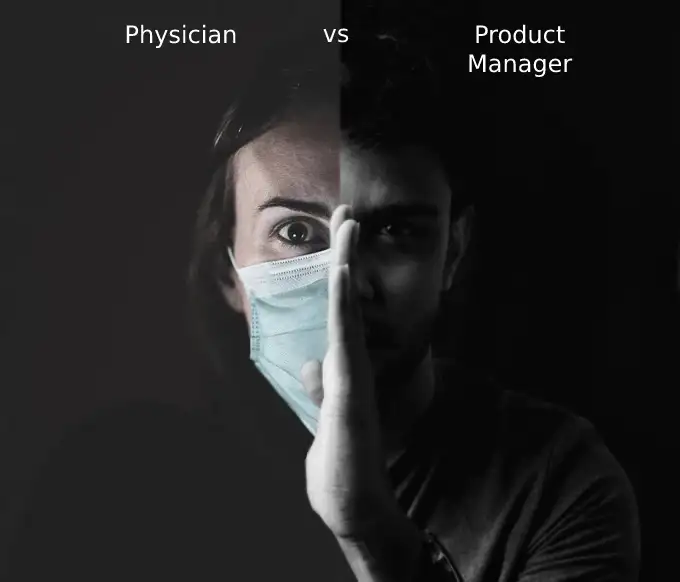The 9 Lessons Product Managers Should Learn from Physicians

About four years ago, I agreed to manage a product without knowing the realm I had stepped into. Let me confess more precisely: although I had been active in the software field for almost a decade, I did not know the exact duties of a product manager and I did not know how to fulfill them. I only knew we had to make something in our team that the customers were willing to pay for.
During the early months, I was only concerned about finding out what I was exactly doing. Fortunately, the people around me were bearing with me and did not ask me about my responsibility. After a year, I managed to kind of figure it out. However, if someone asked me “What do you exactly do?” I did not have a premeditated answer. Now to thank all of you for turning a blind eye to me during those years, I want to take a few steps back and explain product management a little bit.
Managers and Physicians, Oil and Water
If you pay attention to the title of this article, you definitely agree that this article could be about anything but the definition of product management. Talking about product management and linking it to the world of medicine is like trying to mix oil with water.
In point of fact, the pioneers in the field of technology have proposed accurate definitions of a modern product manager and their duties in the past few decades. However, I decided to put you in a position I experienced four years ago instead of providing a specialized and boring definition: assume you have accepted the responsibility for managing a tech business and with a 10 to 12-member team you are going to develop a product the customers are willing to pay for.
Now that you have shouldered your new responsibility, let us take a look at the world of physicians and learn lessons from them that will be useful in the world of product management. These lessons not only indirectly introduce the scope of your activities to you but also explain the things you need to pay attention to as a product manager. If you are experienced, I advise you to continue reading this article because you may benefit from reviewing these notions.
The 9 Lessons to Learn from Physicians
1- Physicians pay attention to the age of their patients
A physician’s decision may vary by the patient’s age and the disease stage. For instance, it is important to measure the height for a growing child but when the same child reaches puberty, the physician pays attention to other factors.
To make important decisions, product managers must particularly pay attention to the business stage. In the eyes of a product manager, a newly established startup has different needs and priorities than a business in the scaling stage.
2- Physicians rely on data
In many cases, physicians only comment when they see the patient’s test results. The numbers printed on the patient’s test sheet are similar to metrics a product manager takes into account to assess the business status.
Even after prescribing medications, a specialist sometimes demands a new test to ensure the desired result is obtained. Similarly, the product manager must monitor the achievements obtained from the implementation of a feature or implementation of solutions by assessing key results.
3- Physicians make subjective decisions
If one of the patient’s health indicators is not normal, the physician interprets what has happened to the patient based on all quantitative (such as the test results) and qualitative (such as patient’s medical history) data, and then he/she writes a prescription. In fact, the patient’s tests and symptoms influence the physician’s decision but they do not limit his/her options. In other words, the physician is not obedient to the test results. He/She may doubt the data, repeat the tests, or even demand a new test to examine the patient from another aspect.
The product manager should also be aware of the data and take into account facts in the decision-making with the aid of intuition and the sixth sense that are relevant to the future or are not easily reflected in the data. He/she must always worry about the latent variables that mislead our interpretation of the statistics.
4- Physicians are professional interviewers
Diagnosis usually begins with hearing the patient’s medical history. Before delving into quantitative data, the physician carefully listens to the patient’s pains and complaints. If we look at the world of medicine through the eyes of a product manager, visiting the customer is similar to interview sessions a product manager holds with the potential customers. At these sessions, the product manager should be able to acquire information that is neglected by the customer or is not disclosed by the customer by asking key questions similar to a powerful physician. Both the physician and the product manager should conduct the sessions in order to acquire useful information.
5- Physicians do not trust what they hear
I will never be surprised if someone goes to the doctor for their heart pain and then gets out of the office with stomach medication. Similarly, a psychiatrist may listen to a customer talk for hours in pain and finally decide that the cause of their conflicts with their spouse is “death anxiety”! In fact, physicians can properly understand the difference between a “complication” and a “disease”.
Similar to a physician, a product manager must analyze the customer’s history as one of the important inputs but should not fully trust it. Analyzing the customer’s pain as described by the customer is not necessarily what treats the customer.
Physicians can properly understand the difference between a “complication” and a “disease”.
6. Physicians leave their desks
A good physician does not solely rely on the nurses’ and interns’ reports; rather, he/she leaves his/her desk and physically visits the hospitalized patients in person to closely examine their condition. By observing the patient’s condition and communicating directly, the physician can gain a realistic understanding of the patient’s condition.
Product managers must also leave their desks and get out of their workplace buildings to communicate with the stakeholders in person.
7- Physicians are well aware of how to empathize
If a doctor is skilled and experienced but does not spend enough time on listening to you, you may experience anxiety and distress. A good physician listens patiently and respectfully to your sufferings and eases your worries about the possible disease by providing clear explanations.
A good product manager should also be able to visualize the condition from the viewpoint of different stakeholders, empathize with them, and assure them that he/she is well aware of their concerns.
8- Physicians are responsible humans
Responsibility can be seen in the eyes of a physician who wakes up in the middle of the night to bring a baby into this world. During a pandemic, physicians consider themselves responsible for the patients’ health even when taking care of patients jeopardizes their own health.
Product managers are, in fact, responsible managers. They must take responsibility for a product without making excuses and must make every effort to ensure the success of the product.
9- Physicians do not fall in love with medications
There is no romantic relationship between the physicians and medications. They only prescribe medications to solve the problems or improve the patient’s condition. The medication has to be at least useful or necessary for the patient’s health. Product managers also do not fall in love with the solutions.

Similarly, good product managers never fall in love with their ideas. They believe the solutions, ideas, and competencies should only be used to solve the problems or improve the conditions. Before applying any competence, they determine how they want to influence the customer and determine the outcomes of adding that competence to the business.